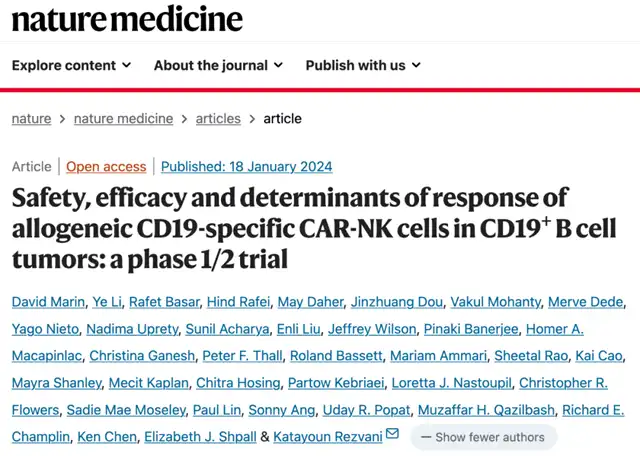Allogeneic CAR-NK Therapy Shows Promise in Phase 1/2 Trial
- Normal Liver Cells Found to Promote Cancer Metastasis to the Liver
- Nearly 80% Complete Remission: Breakthrough in ADC Anti-Tumor Treatment
- Vaccination Against Common Diseases May Prevent Dementia!
- New Alzheimer’s Disease (AD) Diagnosis and Staging Criteria
- Breakthrough in Alzheimer’s Disease: New Nasal Spray Halts Cognitive Decline by Targeting Toxic Protein
- Can the Tap Water at the Paris Olympics be Drunk Directly?
Allogeneic CAR-NK Therapy Shows Promise in Phase 1/2 Trial
- Should China be held legally responsible for the US’s $18 trillion COVID losses?
- CT Radiation Exposure Linked to Blood Cancer in Children and Adolescents
- FDA has mandated a top-level black box warning for all marketed CAR-T therapies
- Can people with high blood pressure eat peanuts?
- What is the difference between dopamine and dobutamine?
- How long can the patient live after heart stent surgery?
Allogeneic CAR-NK Therapy Shows Promise in Phase 1/2 Trial
Promising Clinical Outcomes and Enhanced Safety with Allogeneic CAR-NK Therapy Revealed in a Phase 1/2 Trial.
In 2010, Professor Carl June pioneered the advancement of CAR-T cell therapy into human clinical trials, successfully “curing” multiple leukemia patients. By 2017, the FDA had granted its first approval for CAR-T therapy, and currently, six CAR-T therapies are FDA-approved for treating blood-related cancers like leukemia and lymphoma.
While the success of CAR-T cell therapy has brought renewed hope to cancer patients awaiting bone marrow matches, it is still hindered by challenges such as high costs, long manufacturing cycles, and side effects (cytokine storms, neurotoxicity, etc.). Moreover, the need for treatment in specialized medical centers severely limits the accessibility of this life-saving therapy.
Scientists are now turning their attention to more cost-effective, safe, and efficient “off-the-shelf” cell therapies.
Published on January 18, 2024, in Nature Medicine, researchers from the University of Texas MD Anderson Cancer Center released a study titled “Safety, efficacy and determinants of response of allogeneic CD19-specific CAR-NK cells in CD19+ B cell tumors: a phase 1/2 trial.”
In this phase 1/2 clinical trial involving 37 patients with recurrent or refractory CD19-positive B-cell malignancies, cord blood-derived CAR-NK cell therapy expressing anti-CD19 CAR and IL-15 demonstrated similar therapeutic effects to autologous CD19 CAR-T cell therapy but with significantly enhanced safety. The CAR-NK therapy did not result in severe cytokine storms, neurotoxicity, or graft-versus-host disease (GvHD).
The study identified that manufacturing CAR-NK cells from cord blood units (CBUs) with low nucleated red blood cell content, cryopreserved within 24 hours of collection, was a crucial predictor of outstanding treatment outcomes.

The research team developed a CAR-NK cell therapy called CAR19/IL-15 NK, utilizing retroviral transduction to express anti-CD19 CAR on cord blood-derived NK cells. IL-15 expression was added to enhance CAR-NK cell expansion in vivo, and an inducible caspase-9 (iC9) suicide gene was also expressed to induce CAR-NK cell apoptosis in cases of unacceptable toxicity, further increasing safety.
The phase 1/2 clinical trial, involving 37 patients with recurrent or refractory CD19-positive B-cell malignancies, aimed to validate the safety and efficacy of the cord blood-derived NK cell therapy expressing anti-CD19 CAR and IL-15 (CAR19/IL-15 NK). Primary endpoints included safety and efficacy, defined by overall response rate (OR) at day 30, with secondary endpoints covering OR at day 100, progression-free survival (PFS), overall survival (OS), and persistence of CAR19/IL-15 NK cells.
Results indicated an OR of 48.6% at both day 30 and day 100, with a one-year progression-free survival rate of 32% and an overall survival rate of 68%. Importantly, the trial reported favorable safety outcomes, with no severe cytokine storms, neurotoxicity, or GvHD observed in patients.
Another key finding of the trial emphasized the critical importance of selecting criteria for allogeneic cord blood donors to manufacture CAR NK cells. CBUs cryopreserved within 24 hours and those with low nucleated red blood cell content (≤8×107) showed significantly better treatment outcomes. CAR NK cells manufactured from these CBUs resulted in a one-year progression-free survival rate of 69% and an overall survival rate of 94%, whereas those from CBUs with higher nucleated red blood cell content or longer freezing intervals yielded rates of 5% and 48%, respectively.
These findings underscore that CAR-NK cells manufactured from CBUs with nucleated red blood cells ≤8×107 and cryopreserved within 24 hours are crucial predictors of outstanding treatment results. The research team also validated the superior anti-tumor activity of CAR/IL-15 NK cells from optimal CBUs in various mouse models, revealing new biological characteristics of CAR-NK cells and emphasizing the importance of donor selection in allogeneic cell therapy.
Professor Katayoun Rezvani, the corresponding author of the paper, expressed encouragement at the positive responses observed in these patients, and the team plans to further assess the long-term efficacy of CAR NK cell therapy in treating these malignant tumors.
Link to the paper: Nature Medicine
Allogeneic CAR-NK Therapy Shows Promise in Phase 1/2 Trial
(source:internet, reference only)
Disclaimer of medicaltrend.org
Important Note: The information provided is for informational purposes only and should not be considered as medical advice.



